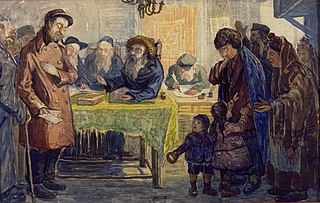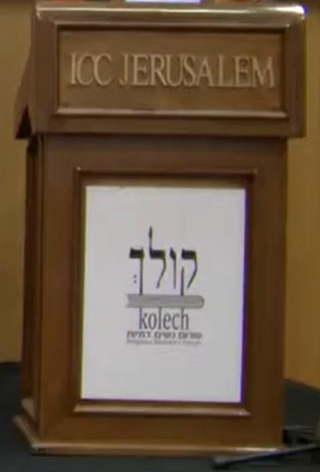
The role of women in Judaism is determined by the Hebrew Bible, the Oral Law, by custom, and by cultural factors. Although the Hebrew Bible and rabbinic literature mention various female role models, religious law treats women differently in various circumstances. According to a 2017 study by the Pew Research Center, women are slightly more numerous among worldwide Jewish population (52%).

Conversion to Judaism is the process by which non-Jews adopt the Jewish religion and become members of the Jewish ethnoreligious community. It thus resembles both conversion to other religions and naturalization. The procedure and requirements for conversion depend on the sponsoring denomination. Furthermore, a conversion done in accordance with one Jewish denomination is not a guarantee of recognition by another denomination. Normally, though not always, the conversions performed by more stringent denominations are recognized by less stringent ones, but not the other way around. A formal conversion is also sometimes undertaken by individuals whose Jewish ancestry is questioned or uncertain, even if they were raised Jewish, but may not actually be considered Jews according to traditional Jewish law.
A beit din is a rabbinical court of Judaism. In ancient times, it was the building block of the legal system in the Biblical Land of Israel. Today, it is invested with legal powers in a number of religious matters both in Israel and in Jewish communities in the Diaspora, where its judgments hold varying degrees of authority in matters specifically related to Jewish religious life.
An agunah is a Jewish woman who is stuck in her religious marriage as determined by halakha. The classic case of this is a man who has left on a journey and has not returned, or has gone into battle and is missing in action. It is used as a borrowed term to refer to a woman whose husband refuses, or is unable, to grant her a divorce.
Legal responses to agunah are civil legal remedies against a spouse who refuses to cooperate in the process of granting or receiving a Jewish legal divorce or "get".

A get or gett is a document in Jewish religious law which effectuates a divorce between a Jewish couple. The requirements for a get include that the document be presented by a husband to his wife. The essential part of the get is a very short declaration: "You are hereby permitted to all men". The effect of the get is to free the woman from the marriage, and consequently she is free to marry another and that the laws of adultery no longer apply. The get also returns to the wife the legal rights that a husband held in regard to her.

The Israel Movement for Reform and Progressive Judaism is the organizational branch of Progressive Judaism in Israel, and a member organization of the World Union for Progressive Judaism. It currently has 40 communities and congregations around the state of Israel, 13 of which are new congregations, referred to as "U'faratztah" communities, and two kibbutzim, Yahel and Lotan.
Jewish feminism is a movement that seeks to make the religious, legal, and social status of Jewish women equal to that of Jewish men in Judaism. Feminist movements, with varying approaches and successes, have opened up within all major branches of the Jewish religion.

Zalman Nechemia Goldberg was a rabbi, posek, and rosh yeshiva in Israel. The scion of a Lithuanian Jewish family, Goldberg was also a son-in-law of Shlomo Zalman Auerbach.

The Chief Rabbinate of Israel is recognized by law as the supreme rabbinic authority for Judaism in Israel. The Chief Rabbinate Council assists the two Chief Rabbis, who alternate in its presidency. It has legal and administrative authority to organize religious arrangements for Israel's Jews. It also responds to halakhic questions submitted by Jewish public bodies in the Diaspora. The Council sets, guides, and supervises agencies within its authority.
Michael Jay Broyde is a professor of law and the academic director of the Law and Religion Program at Emory University School of Law. He is also a senior fellow in the Center for the Study of Law and Religion at Emory University. His primary areas of interest are law and religion, Jewish law and Jewish ethics, and comparative religious law. Broyde has published 200 articles on various aspects of law and religion and Jewish law, and a number of articles in the area of federal courts.

The Lieberman clause is a clause included in a ketubah, created by and named after Talmudic scholar and Jewish Theological Seminary of America professor Saul Lieberman, that stipulates that divorce will be adjudicated by a modern bet din in order to prevent the problem of the agunah, a woman not allowed to remarry religiously because she had never been granted a religious divorce. It was first introduced in the 1950s by rabbis in Judaism's Conservative movement.

Marriage in Israel can be performed only under the auspices of the religious community to which couples belong, and inter-faith marriages performed within the country are not legally recognized. Matrimonial law is based on the millet or confessional community system which had been employed in the Ottoman Empire, including what is now Israel, was not modified during the British Mandate of the region, and remains in force in the State of Israel.
The Jewish prenuptial agreement has been developed in recent times with the stated intent of keeping the Jewish woman from becoming an agunah in cases where the husband refuses to grant her a get. Without such an agreement, Jewish marriages cannot be dissolved without the consent and cooperation of both spouses. This new type of prenuptial agreement makes provisions for the possibility of divorce. By setting up rules prior to the marriage in the form of a contract, both spouses have an interest to negotiate a divorce in a dignified manner, and get-refusal is avoided.
Midreshet Lindenbaum, originally named Michlelet Bruria, is a midrasha in Talpiot, Jerusalem. It counts among its alumnae many of the teachers at Matan, Nishmat, Pardes and other women's and co-ed yeshivas in Israel and abroad.

Harry Halpern was an American religious and community leader, a powerful orator, a respected religious educator, and a prominent Conservative rabbi who served for almost 49 years as the rabbi of the East Midwood Jewish Center (EMJC), in Brooklyn, New York.

Women in Israel comprise 50.26 percent of the state's population as of 2019. While Israel lacks an official constitution, the Israeli Declaration of Independence of 1948 states that “The State of Israel (…) will ensure complete equality of social and political rights to all its inhabitants irrespective of religion, race or sex.”

Aviad Hacohen is an Israeli attorney and professor of law.

Ohr Torah Stone (OTS) is an international Modern Orthodox movement that aims to develop Jewish life, learning, and leadership. The organization is led by Rabbi Dr. Kenneth Brander. In 1983 OTS was founded by Rabbi Dr. Shlomo Riskin. As of 2020 OTS included 27 educational institutions under its auspices.

Kolech, also known as Kolech: Religious Women's Forum, is an Israeli women's organization associated with Orthodox Judaism. The group's stance is aligned with Orthodox Jewish feminism and religious Zionism.















